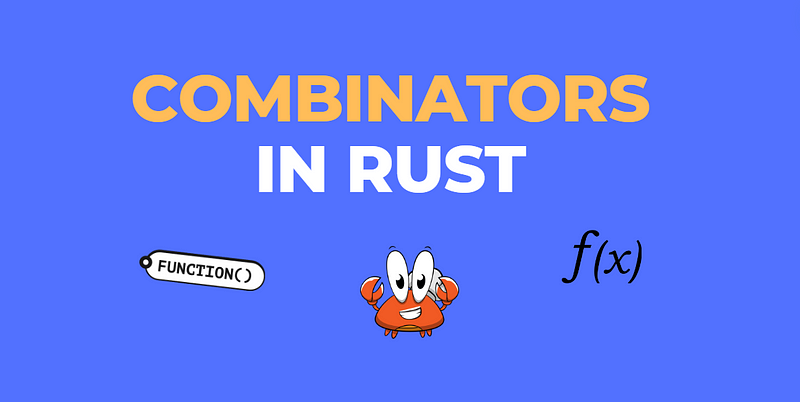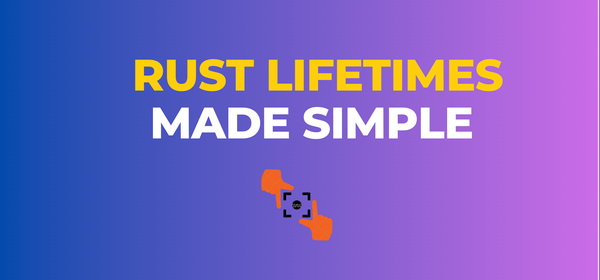Combinators in Rust
Combinators are higher-order functions that can combine or transform functions, enabling more abstract and concise code.

Combinators are higher-order functions that can combine or transform functions, enabling more abstract and concise code.
Let’s explore the theory behind combinators and do some combinators coding in Rust.
Theoretical Foundations
In functional programming, a combinator is a function constructed solely from other functions without relying on variables or constants. The roots of combinators trace back to combinatory logic, a foundational theory in mathematical logic that predates computer science. In this context, combinators serve as the building blocks for constructing expressions and encapsulating computation patterns.
Why Combinators in Rust?
Rust’s embrace of functional programming concepts, such as higher-order functions, closures, and pattern matching, provides a fertile ground for using combinators. Combinators can enhance code readability, reduce boilerplate, and facilitate a declarative programming style. By leveraging combinators, Rust developers can express complex logic succinctly and compose reusable components effectively.
Basic Combinators in Rust
Let’s start with some basic combinators that are frequently used in Rust programming.
map
The map combinator applies a function to each element of an iterator, transforming them into a new form. It's widely used for data transformation tasks.
let nums = vec![1, 2, 3, 4];
let squares: Vec<i32> = nums.iter().map(|&x| x * x).collect();
println!("{:?}", squares); // Output: [1, 4, 9, 16]and_then
The and_then combinator is used with Option and Result types to chain operations that may return Option or Result. It's particularly useful for sequential operations where each step may fail or produce an optional value.
fn sqrt(x: f64) -> Option<f64> {
if x >= 0.0 { Some(x.sqrt()) } else { None }
}
let result = Some(4.0).and_then(sqrt);
println!("{:?}", result); // Output: Some(2.0)filter
The filter combinator is used to selectively include elements from an iterator based on a predicate function.
let nums = vec![1, 2, 3, 4, 5];
let even_nums: Vec<i32> = nums.into_iter().filter(|x| x % 2 == 0).collect();
println!("{:?}", even_nums); // Output: [2, 4]Advanced Combinators and Their Usage
As we delve deeper into Rust’s functional features, we encounter more sophisticated combinators that cater to complex scenarios.
fold
The fold combinator aggregates elements of an iterator by applying a binary operation, starting from an initial value.
let nums = vec![1, 2, 3, 4];
let sum = nums.iter().fold(0, |acc, &x| acc + x);
println!("{}", sum); // Output: 10zip
The zip combinator pairs up elements from two iterators into a single iterator of tuples. It's useful for iterating over two sequences in parallel.
let nums1 = vec![1, 2, 3];
let nums2 = vec![4, 5, 6];
let zipped: Vec<_> = nums1.iter().zip(nums2.iter()).collect();
println!("{:?}", zipped); // Output: [(1, 4), (2, 5), (3, 6)]Combinators with Closures
Closures in Rust are anonymous functions that can capture their environment. Combining closures with combinators allows for powerful and flexible code patterns.
let threshold = 2;
let nums = vec![1, 2, 3, 4];
let filtered: Vec<i32> = nums.into_iter().filter(|&x| x > threshold).collect();
println!("{:?}", filtered); // Output: [3, 4]Practical Applications
Combinators find practical applications in various domains, such as data processing, asynchronous programming, and functional reactive programming (FRP). For instance, in web development with frameworks like Actix or Rocket, combinators are used to compose middleware and request handlers in a declarative manner.
// Hypothetical example with a web framework
let app = App::new()
.route("/", HttpMethod::GET, |req| {
req.query("id")
.and_then(parse_id)
.map(fetch_data)
.map(Json)
});In this example, the route handler chains several operations: extracting a query parameter, parsing it, fetching data based on the parsed ID, and finally wrapping the response in JSON.
Error Handling with Combinators
Rust’s Result type is a powerful tool for error handling, representing a computation that might fail. Combinators like map, and_then, or_else, and map_err allow for elegant and concise error-handling workflows.
map_err
The map_err combinator is used to transform the error part of a Result. It's particularly useful when you need to convert errors from one type to another.
fn parse_number(num_str: &str) -> Result<i32, String> {
num_str.parse::<i32>().map_err(|e| e.to_string())
}
let result = parse_number("10");
println!("{:?}", result); // Output: Ok(10)
let result = parse_number("a10");
println!("{:?}", result); // Output: Err("invalid digit found in string")or_else
The or_else combinator provides a way to handle errors and possibly recover from them, allowing for fallback operations or error transformations.
fn try_parse_or_zero(num_str: &str) -> Result<i32, String> {
num_str.parse::<i32>().or_else(|_| Ok(0))
}
let result = try_parse_or_zero("20");
println!("{:?}", result); // Output: Ok(20)
let result = try_parse_or_zero("abc");
println!("{:?}", result); // Output: Ok(0)Asynchronous Programming with Combinators
Rust’s asynchronous programming model, based on futures and async/await, heavily relies on combinators to manage asynchronous computations. Combinators like then, and_then, map, and map_err are used with Futures to chain asynchronous operations in a non-blocking way.
Using and_then with Futures
The and_then combinator can be used with futures to perform sequential asynchronous operations, where the output of one operation is the input to the next.
async fn fetch_url(url: &str) -> Result<String, reqwest::Error> {
reqwest::get(url).await?.text().await
}
async fn process_url_data(url: &str) {
fetch_url(url)
.and_then(|data| async move {
println!("Fetched data: {}", data);
Ok(())
})
.await
.unwrap_or_else(|e| eprintln!("Error fetching data: {}", e));
}
// In an async runtime context
// process_url_data("http://example.com").await;This example demonstrates fetching data from a URL and then processing that data asynchronously. The and_then combinator ensures that the data processing step only occurs if the data fetching step succeeds.
Combining Futures with join! and select!
Rust also provides macros like join! and select! to work with multiple futures concurrently, allowing for parallel computation and race conditions handling.
join!waits for all futures to complete and returns a tuple of their results.select!waits for the first future to complete and returns its result, cancelling the remaining futures.
async fn task_one() -> i32 { 1 }
async fn task_two() -> i32 { 2 }
async fn run_tasks() {
let (result_one, result_two) = join!(task_one(), task_two());
println!("Results: {}, {}", result_one, result_two);
let either = select! {
result_one = task_one().fuse() => result_one,
result_two = task_two().fuse() => result_two,
};
println!("First completed: {}", either);
}
// In an async runtime context
// run_tasks().await;Chaining and Composition
One of the key features of combinators is their ability to chain operations. Rust’s standard library provides numerous methods on types like Option, Result, and iterators, which are essentially built-in combinators.
Chaining allows for the composition of multiple operations in a concise and readable manner. For example, using Option's map and and_then methods:
fn square(x: i32) -> i32 { x * x }
fn to_str(x: i32) -> Option<String> { Some(x.to_string()) }
let result: Option<String> = Some(2).map(square).and_then(to_str);Here, square is applied to the value inside Some, and then to_str transforms the squared number into a string, all in a seamless chain of operations.
Crafting your own combinator
Step 1: Understanding the Goal
First, it’s essential to define what your combinator will do. For this guide, let’s create a combinator named maybe_apply. This combinator will work with the Option type and take two arguments: an Option<T> and a function F that takes a T and returns a U. The combinator will apply the function to the value inside the Option if it is Some, otherwise, it will return None.
Step 2: Setting Up Your Rust Environment
Ensure you have a Rust environment set up. You’ll need Rust installed on your system, which you can do by following the instructions on the official Rust website.
Step 3: Writing the Combinator
Open your favorite editor or IDE, and start a new Rust project if necessary:
cargo new combinators_example
cd combinators_exampleNow, open the src/lib.rs file (or src/main.rs if you prefer an executable) and start implementing the maybe_apply combinator.
Step 4: Implementing maybe_apply
fn maybe_apply<T, U, F>(option: Option<T>, f: F) -> Option<U>
where
F: FnOnce(T) -> U,
{
match option {
Some(value) => Some(f(value)),
None => None,
}
}In this implementation:
TandUare type parameters representing the types before and after applying the functionF.Fis constrained byFnOnce(T) -> U, meaning it takes aTand returns aU.FnOnceis used because the function is consumed once called, suitable for closures that take ownership of their captured variables.- The
matchexpression checks if theOptionisSomeorNone. IfSome, it appliesfto the contained value, otherwise, it propagatesNone.
Step 5: Testing Your Combinator
To verify that maybe_apply works as intended, write some tests. Add the following code to the bottom of your lib.rs or main.rs:
#[cfg(test)]
mod tests {
use super::*;
#[test]
fn test_maybe_apply_some() {
let result = maybe_apply(Some(5), |x| x * 2);
assert_eq!(result, Some(10));
}
#[test]
fn test_maybe_apply_none() {
let result: Option<i32> = maybe_apply(None, |x: i32| x * 2);
assert_eq!(result, None);
}
}These tests cover the two possible scenarios: applying the function to a value inside Some and passing a None through unchanged.
Step 6: Running Your Tests
Run your tests to ensure everything works as expected:
cargo testIf all goes well, you should see output indicating that both tests have passed.
Step 7: Using Your Combinator in Practice
With maybe_apply tested and ready, you can now use it in your Rust applications. Here's a simple example:
fn main() {
let value = Some(10);
let doubled = maybe_apply(value, |x| x * 2);
println!("Doubled: {:?}", doubled); // Should print "Doubled: Some(20)"
}🚀 Explore More by Luis Soares
📚 Learning Hub: Expand your knowledge in various tech domains, including Rust, Software Development, Cloud Computing, Cyber Security, Blockchain, and Linux, through my extensive resource collection:
- Hands-On Tutorials with GitHub Repos: Gain practical skills across different technologies with step-by-step tutorials, complemented by dedicated GitHub repositories. Access Tutorials
- In-Depth Guides & Articles: Deep dive into core concepts of Rust, Software Development, Cloud Computing, and more, with detailed guides and articles filled with practical examples. Read More
- E-Books Collection: Enhance your understanding of various tech fields with a series of free e-Books, including titles like “Mastering Rust Ownership” and “Application Security Guide” Download eBook
- Project Showcases: Discover a range of fully functional projects across different domains, such as an API Gateway, Blockchain Network, Cyber Security Tools, Cloud Services, and more. View Projects
- LinkedIn Newsletter: Stay ahead in the fast-evolving tech landscape with regular updates and insights on Rust, Software Development, and emerging technologies by subscribing to my newsletter on LinkedIn. Subscribe Here
🔗 Connect with Me:
- Medium: Read my articles on Medium and give claps if you find them helpful. It motivates me to keep writing and sharing Rust content. Follow on Medium
- Personal Blog: Discover more on my personal blog, a hub for all my Rust-related content. Visit Blog
- LinkedIn: Join my professional network for more insightful discussions and updates. Connect on LinkedIn
- Twitter: Follow me on Twitter for quick updates and thoughts on Rust programming. Follow on Twitter
Wanna talk? Leave a comment or drop me a message!
All the best,
Luis Soares
luis.soares@linux.com
Senior Software Engineer | Cloud Engineer | SRE | Tech Lead | Rust | Golang | Java | ML AI & Statistics | Web3 & Blockchain



